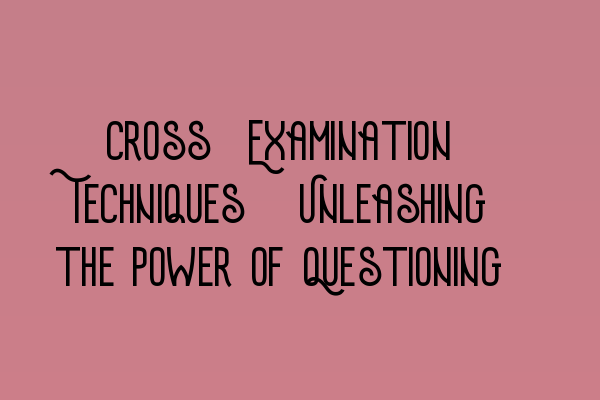Cross-Examination Techniques: Unleashing the Power of Questioning
Welcome to the SQE Criminal Law & Practice Law UK blog! In today’s post, we will dive into the world of cross-examination techniques and explore the power of questioning in criminal law cases. Effective cross-examination can make or break a case, so it’s vital to understand the strategies and techniques that can help you excel in this crucial aspect of the legal process.
The Art of Cross-Examination
Cross-examination is a fundamental part of a barrister’s toolkit. It is during this phase of a trial that legal representatives have the opportunity to test the credibility and accuracy of the evidence presented by the opposing party. A skilled cross-examiner can exploit weaknesses in the opposing witness’s testimony, discredit their version of events, and reinforce their own case.
When it comes to cross-examination, preparation is key. Before entering the courtroom, it is essential to thoroughly review all the evidence, statements, and affidavits related to the case. By meticulously analyzing the details and identifying potential inconsistencies or gaps, you can develop a compelling line of questioning that will expose the weaknesses in the opponent’s case.
Powerful Questioning Techniques
The success of cross-examination lies in asking the right questions at the right time. Here are some powerful questioning techniques that can be employed to maximize the impact:
- Leading Questions: Asking questions that suggest the desired answer can help to control the witness’s responses and lead them towards supporting your case. For example, “Isn’t it true that the defendant was not present at the scene of the crime?”
- Open-Ended Questions: These questions allow the witness to provide detailed answers, which can be useful in uncovering additional information or revealing inconsistencies. For instance, “Can you describe what you saw on the night of the incident?”
- Repetition: Repeating key questions can help to emphasize crucial points and elicit important details. It can also expose contradictions if the witness provides different responses on different occasions.
- Cross-Examination by Contradiction: By confronting the witness with contradictory evidence or prior statements, you can challenge their credibility and undermine their version of events. This technique requires careful preparation and attention to detail.
These are just a few examples of the many cross-examination techniques available. Each case is unique, and it’s important to adapt your approach to suit the circumstances and objectives of your client.
Continued Learning and Professional Development
Mastering cross-examination techniques is an ongoing process. As legal professionals, it is vital to continuously enhance our skills and stay updated with the latest developments in the field of criminal law. Workshops and seminars on criminal practice, such as the ones offered by SQE Criminal Law & Practice Law UK, can provide valuable insights and practical guidance.
If you’re looking to expand your expertise and enhance your professional capabilities, we highly recommend checking out our Workshops and Seminars on Criminal Practice: Expanding Your Expertise article. It provides information on upcoming events and opportunities to learn from experienced practitioners in the field.
Additionally, to stay informed and prepared regarding updates in UK criminal laws, be sure to read our article on Updates in UK Criminal Laws: Staying Informed and Prepared.
Conclusion
In conclusion, cross-examination is a critical stage in any criminal trial, and mastering the art of questioning is essential for success. By employing powerful questioning techniques and continuously enhancing our skills through professional development opportunities, we can better serve our clients and achieve favorable outcomes in the courtroom.
If you’re interested in further resources and information related to criminal law practice, we encourage you to explore our articles on Enhancing Your SQE Criminal Law Study Group Experience, Decoding Criminal Evidence Rules: A Detailed Analysis, and Deep Dive into Fraud and Financial Crimes in the UK.
